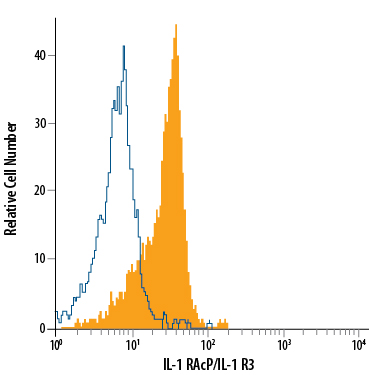Human IL-1 RAcP/IL-1 R3 Alexa Fluor® 488-conjugated Antibody
R&D Systems, part of Bio-Techne | Catalog # FAB676G


Key Product Details
Species Reactivity
Validated:
Applications
Label
Antibody Source
Product Summary
Specificity
Clonality
Host
Isotype
Scientific Data Images
Detection of IL‑1 RAcP/IL‑1 R3 in Human Blood Monocytes by Flow Cytometry.
Human peripheral blood monocytes were stained with Mouse Anti-Human IL-1 RAcP/IL-1 R3 Alexa Fluor® 488-conjugated Monoclonal Antibody (Catalog # FAB676G, filled histogram) or isotype control antibody (Catalog # IC002G, open histogram). View our protocol for Staining Membrane-associated Proteins.Applications
Flow Cytometry
Sample: Human peripheral blood monocytes
Formulation, Preparation, and Storage
Formulation
Shipping
Stability & Storage
Background: IL-1 RAcP/IL-1 R3
IL-1 Receptor Accessory Protein (also IL-1 R3) is a ubiquitous 70-90 kDa member of the interleukin-1 receptor family of proteins (1-5). It serves as a non-ligand-binding accessory component of the receptors for IL-1 alpha, IL-1 beta, and IL-33 (6, 7). Together with IRAK4 and MyD88, it generates a functional signaling complex with IL-1 RI; by itself, it generates a non-signaling, but high-affinity binding complex with IL-1 RII (8). In addition, it interacts with ST2 on mast cells and Th2 T cells to create a functional IL-33 receptor complex (7). Mature human IL-1 RAcP is a type I transmembrane glycoprotein that is 550 amino acids in length. It contains a 347 amino acid (aa) extracellular region (aa 21-367), a 21 aa transmembrane segment, and a 182 aa cytoplasmic domain (9). The extracellular region shows three C2-type Ig-like domains, the most membrane proximal of which is suggested to be responsible for dimerization with IL-1 RI (10). There are three alternative splice forms reported for IL-1 RAcP. One is transmembrane and shows a 239 aa substitution for the C-terminal 122 amino acids (11). The other two are soluble; one shows a six aa substitution for aa 351-570, while a second shows a 45 aa substitution for aa 302-579 (12, 13). The soluble receptor isoforms appear to be inhibitory to IL-1 signaling. When present with soluble IL-1 RII, soluble IL-1 RAcP increases the IL-1 binding affinity of IL-1 RII more than 100-fold, thus neutralizing the effects of IL-1 (14). The human and mouse IL-1 RAcP precursors are 89% aa identical; within the extracellular region, they share 86% aa identity.
References
- Subramaniam, S. et al. (2004) Dev. Comp. Immunol. 28:415.
- Boraschi, D. and A. Tagliabue (2006) Vitam. Horm. 74:229.
- Dunne, A. and L.A.J. O'Neill (2003) Sci STKE. Feb 25;2003(171):re3.
- Huang, J. et al. (1997) Proc. Natl. Acad. Sci. USA 94:12829.
- Greenfeder, S. A. et al. (1995) J. Biol. Chem. 270:13757.
- Brikos, C. et al. (2007) Mol. Cell. Proteomics 6:1551.
- Chackerian, A.A. et al. (2007) J. Immunol. 179:2551.
- Lang, D. et al. (1998) J. Immunol. 161:6871.
- SwissProt. Accession # Q9NPH3.
- Yoon, D-Y. and C.A. Dinarello (1998) J. Immunol. 160:3170.
- Lu, H-L. et al. (2008) Mol. Immunol. 45:1374.
- Jensen, L.E. et al. (2000) J. Immunol. 164:5277.
- Jensen, L.E. and A.S. Whitehead (2003) Cell. Signal. 15:793.
- Smith, D.E. et al. (2003) Immunity 18:87.
Long Name
Alternate Names
Gene Symbol
UniProt
Additional IL-1 RAcP/IL-1 R3 Products
Product Specific Notices
This product is provided under an agreement between Life Technologies Corporation and R&D Systems, Inc, and the manufacture, use, sale or import of this product is subject to one or more US patents and corresponding non-US equivalents, owned by Life Technologies Corporation and its affiliates. The purchase of this product conveys to the buyer the non-transferable right to use the purchased amount of the product and components of the product only in research conducted by the buyer (whether the buyer is an academic or for-profit entity). The sale of this product is expressly conditioned on the buyer not using the product or its components (1) in manufacturing; (2) to provide a service, information, or data to an unaffiliated third party for payment; (3) for therapeutic, diagnostic or prophylactic purposes; (4) to resell, sell, or otherwise transfer this product or its components to any third party, or for any other commercial purpose. Life Technologies Corporation will not assert a claim against the buyer of the infringement of the above patents based on the manufacture, use or sale of a commercial product developed in research by the buyer in which this product or its components was employed, provided that neither this product nor any of its components was used in the manufacture of such product. For information on purchasing a license to this product for purposes other than research, contact Life Technologies Corporation, Cell Analysis Business Unit, Business Development, 29851 Willow Creek Road, Eugene, OR 97402, Tel: (541) 465-8300. Fax: (541) 335-0354.
For research use only